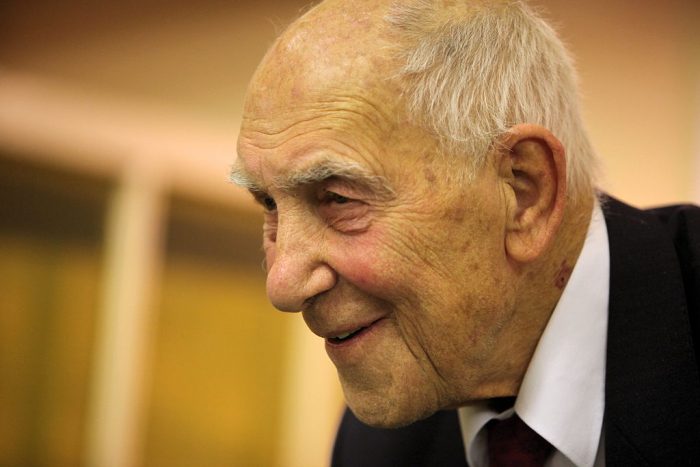
*Editor’s Note: Elephant Journal articles represent the personal views of the authors, and can not possibly reflect Elephant Journal as a whole. Disagree with an Op-Ed or opinion? We’re happy to share your experience here.
~
Back when I still dreamed of a career in journalism, I wrote a thesis on Zionism.
Eventually, I ended up going down a completely different professional rabbit hole, but the hope of one day asking big questions to world leaders still remained.
Life has an uncanny way of making sure that at some point you have to deal with whatever it is you’ve been suppressing. Throughout the years, I kept on running into people who seemed to nudge me in the direction of that initial plan, but I always found a reason to ignore the signs.
One of those people was none other than Stéphane Hessel, whom I got to interview in Brussels in 2011.
To say that Mr. Hessel has always been a huge source of inspiration to me would be a gross understatement. Aside from being instrumental in the Indignados movement that started in Spain and eventually made its way to Wall Street and London (which was the reason why I got to interview him), he is of course best known for having collaborated with Eleanor Roosevelt on the final drafting of the Universal Declaration of Human Rights.
Hessel was 93 years old when I got to interview him. Even though he needed help getting on stage, every answer he gave me was imbued with such clarity and conviction that I could easily see why this man had made such a mark on humanity. He overwhelmed me with his contagious sense of purpose, as I eagerly soaked up his message about how human life is never to be taken for granted.
I have been thinking about him a lot lately.
There were two moments that we managed to keep to ourselves, despite being surrounded by a noisy audience. Firstly, the gratitude he expressed toward me as I helped him get off the stage. Turns out the pain three little steps could inflict on his body had become more debilitating than the torture he once endured as a prisoner of war in the Nazi concentration camps. The lengths he went to as a young man (as a partisan, a POW, protester, diplomat, and writer) contributed to making the world a safer place but had now taken their toll on his limbs. And yet he continued to fiercely direct his outrage at the gap between the rich and the poor, and fight for the protection of the welfare system. He was also a passionate voice for the Palestinians whom he believed had been horrendously “betrayed” by the architects of post-war Europe.
He told me about how he once took on someone else’s identity to survive. He did so by pretending to be a man who had perished so his own life would be spared. Or at least, that’s what I made of it. Recently, I’ve been wondering if the story was meant as a metaphor. Perhaps he was in fact alluding to the distance that separates us from “the other.” Perhaps the ultimate journey toward peace involves seeing the world through the eyes of our beholders. Perhaps that’s where we finally find each other, so we can stop shouting and lay down our guns.
If there is one thing I learned that day, it’s that gentle giants’ shoes are hard to fill. We need someone who resonates with muted voices to reinstate the value of life: for those who have forsaken their own and for those too young to put up a fight.
“It’s the going down that’s insufferable,” he whispered to me as he clung to my arm. It was just three little steps, and yet such a challenge to a seasoned hero who had been down in the trenches. But his smile remained soft as he knew, just as I did, that in spite of the tricky descent, we had found our common ground. It turns out that people who ask questions aren’t necessarily looking for answers. Sometimes they just want to lean into what they know to be right.
We need more people like Stéphane Hessel, and we need to stop the fighting.
~

This account does not have permission to comment on Elephant Journal.
Contact support with questions.